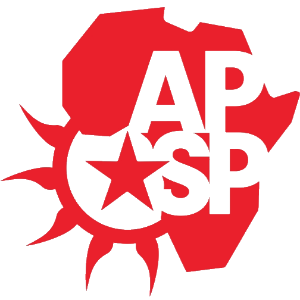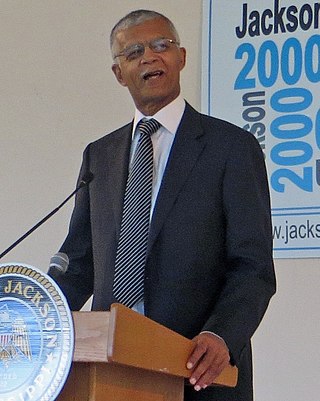Related Research Articles
Tullahassee is a town in Wagoner County, Oklahoma, United States. The population was 106 in both the 2010 and the 2000 censuses. It was the location of Tullahassee Mission, an Indian boarding school that burned in 1880. Because their population in the community had declined, the Muscogee Creek gave the school to Creek Freedmen, paying to replace the main building, and relocated with their families to the area of Wealaka Mission.
Reparations for slavery is the application of the concept of reparations to victims of slavery or their descendants. There are concepts for reparations in legal philosophy and reparations in transitional justice. In the US, reparations for slavery have been both given by legal ruling in court and/or given voluntarily by individuals and institutions.

The Republic of New Afrika (RNA), founded in 1968 as the Republic of New Africa, is a black nationalist organization and black separatist movement in the United States popularized by black militant groups. The larger New Afrika movement in particular has three goals:

Omali Yeshitela is an American political activist, theoretician and author. He is a co-founder and current chairman of the African People's Socialist Party which leads the Uhuru Movement.

The African People's Socialist Party (APSP) is a pan-Africanist political party and organization working towards reparations for slavery in the United States, identifying ideologically with African internationalism and African socialism. The party was formed in May 1972 by the merger of three black power organizations based in Florida and Kentucky. Omali Yeshitela, one of the original co-founders, leads the APSP as of 2019.
The "Slave Reparations Act" is a tax fraud related to the concept of reparations for slavery. The scam claims that filers can receive $5,000 or increased social security payouts for African-Americans born in the United States between 1911 and 1926.
HR 40 may refer to

Akinyele Umoja is an American educator and author who specializes in African-American studies. As an activist, he is a founding member of the New Afrikan People's Organization and the Malcolm X Grassroots Movement. In April 2013, New York University Press published Umoja's book We Will Shoot Back: Armed Resistance in the Mississippi Freedom Movement. Currently, he is a Professor and Department Chair of the Department of African-American Studies at Georgia State University (GSU).
Imari Obadele was a Black nationalist, advocate for reparations, and president of the Republic of New Afrika.

Reparations for slavery is the application of the concept of reparations to victims of slavery and/or their descendants. There are concepts for reparations in legal philosophy and reparations in transitional justice. Reparations can take many forms, including practical and financial assistance to the descendants of enslaved people, acknowledgements or apologies to peoples or nations negatively affected by slavery, or honouring the memories of people who were enslaved by naming things after them.

Chokwe Lumumba was an American attorney, activist, and politician, who was affiliated with the black separatist organization Republic of New Afrika and served as its second vice president. He served as a human rights lawyer in Michigan and Mississippi. In 2013, after serving on the City Council, he was elected as Mayor of Jackson, Mississippi.
African-American self-determination refers to efforts to secure self-determination for African-Americans and related peoples in North America. It often intersects with the historic Back-to-Africa movement and general Black separatism, but also manifests in present and historic demands for self-determination on North American soil, ranging from autonomy to independence. The freedom to make whatever choices as a free American, and willfulness to do for self are often a key demand for advocates of African-American self-determination.

Belinda Sutton, also known as Belinda Royall, was a Ghanaian-born woman who was enslaved by the Royall family at the Royall House and Slave Quarters in Medford, Massachusetts, USA. Additional details of Sutton's family life are under ongoing research. Baptism records for a son Joseph, and a daughter Prine, appear in church records. Belinda was abandoned by, Isaac Royall Jr., when he fled to Nova Scotia at the beginning of the American Revolution. In Royall's will, a number of enslaved people are listed, but Belinda was unique in his wishes:
"In his will he gave his slave Belinda the option of freedom, and he further 'provided that she get security that she shall not be a charge in the town of Medford.' If she did not elect freedom, he bequeathed her to his daughter Mary Erving. Other slaves were bequeathed and some were sold, but Belinda was emancipated."
American Descendants of Slavery (ADOS) is a term referring to descendants of enslaved Africans in the area that would become the United States, and to the political movement of the same name. Both the concept and the movement grew out of the hashtag #ADOS created by Yvette Carnell and Antonio Moore.

The Commission to Study and Develop Reparation Proposals for African-Americans Act, is an Act of Congress in the United States introduced in 1989 by Rep. John Conyers. The act aims to create a commission to examine the merits of introducing reparations to African-Americans for US slavery. The current iteration of the act is sponsored by Rep. Sheila Jackson Lee.
Adjoa Aiyetoro is a lawyer, an activist and the former executive director of the National Conference of Black Lawyers (1993-1997). She was the chief legal consultant to the National Coalition of Blacks for Reparations in America (N'COBRA) and co-chairperson of their Reparations Coordinating Committee. She is now Professor Emerita at the William H. Bowen School of Law at the University of Arkansas, Little Rock.

Robin Rue Simmons is an American former politician and national leader for local reparations for African Americans.
The California Reparations Task Force is a non-regulatory state agency in California established by California Assembly Bill 3121 in 2020 to study and develop reparation proposals for African Americans, especially those who are descendants of persons enslaved in the United States. It was the country's first statewide reparations task committee and was created to study methods to resolve systemic racism against African Americans resulting from slavery's enduring legacy. The task force was designed to recommend ways to educate the California public of the task force's findings and to propose remedies.
Mayors Organized for Reparations and Equity (MORE) is a coalition of U.S. mayors committed to paying reparations to African American citizens of their cities. The association was announced on June 18, 2021, in commemoration of the first federally recognized Juneteenth holiday. Mayors from such large municipalities as Los Angeles, Denver, Sacramento, and Kansas City are part of the coalition, as well as the mayor of the small town of Tullahassee, Oklahoma, with a population of 83.
The Evanston Reparations Committee was established by the City Council of Evanston, Illinois in 2019 as the first publicly funded reparation program for Black Americans. The first program approved for using the funds, cash payments for housing support, was passed by the city in March 2021.
References
Notes
- 1 2 Sinha, Manisha (September 20, 2019). "The Long History of American Slavery Reparations: From the colonial era to today, the bitter legacy of bondage and racial oppression has sparked demands for compensation, with some successes and many broken promises". Wall Street Journal .
- 1 2 RIVAS, REBECCA (June 17, 2022). "Reparations for Black Americans seeing unprecedented national support, advocates say: As Juneteenth nears, civil rights groups call on president to sign executive order to begin reparations process". Missouri Independent .
- ↑ Brown, Maya (February 26, 2022). "Jewish and Japanese American groups among growing multiracial effort calling for reparations for Black Americans". CNN .
- ↑ MARCELO, PHILIP (March 10, 2021). "A price tag on trauma? College town weighs Black reparations". Associated Press .
- ↑ Grove, Rashad (March 16, 2023). "NEWS & POLITICS: SAN FRANCISCO BOARD APPROVES $5 MILLION REPARATION PAYMENTS FOR BLACK RESIDENTS". Ebony .
- 1 2 Williams, Lena (July 21, 1994). "Blacks Press the Case for Reparations for Slavery". The New York Times .
- 1 2 Lewin, Tamar (June 4, 2001). "Calls for Slavery Restitution Getting Louder". The New York Times .
- ↑ Serino, Kenichi; Stabley, Justin (September 16, 2022). "What to know about calls for reparations for Britain's legacy of slavery in the Caribbean". PBS.
- ↑ MACARAEG, SARAH; KUNICHOFF, YANA (March 21, 2017). "How Chicago Became the First City to Make Reparations to Victims of Police Violence: The ordinance provides a meaningful model for creating reparations at the local level". Yes! .
- 1 2 3 4 "What is N'COBRA?". ncobra.org. National Coalition of Blacks for Reparations in America. Retrieved February 26, 2023.
- ↑ Coates, Ta-Nehisi (June 2014). "The Case for Reparations". The Atlantic .
In the 20th century, the cause of reparations was taken up by a diverse cast that included the Confederate veteran Walter R. Vaughan, who believed that reparations would be a stimulus for the South; the black activist Callie House; black-nationalist leaders like "Queen Mother" Audley Moore; and the civil-rights activist James Forman. The movement coalesced in 1987 under an umbrella organization called the National Coalition of Blacks for Reparations in America (N'COBRA).
- ↑ Martin, Douglas (February 5, 2010). "Imari Obadele, Who Fought for Reparations, Dies at 79". The New York Times .
- ↑ "In the News: Mayor Sarno, Representative Williams and Officials Celebrate 37th Annual Black American Heritage with Special Flag Raising Ceremony". springfield-ma.gov. City of Springfield, Massachusetts. February 1, 2023.
- ↑ Winbush, Raymond (2010). Should America Pay?: Slavery and the Raging Debate on Reparations. New York, NY: HarperCollins.
- ↑ Pace, Eric (May 7, 1997). "Queen Mother Moore, 98, Harlem Rights Leader, Dies". The New York Times .
- 1 2 Castro, Gina (February 23, 2023). "National Reparations Awareness Day celebrated, but not well known". Evanston RoundTable.
- ↑ Levy, Jordan (January 20, 2023). "Philadelphia is open to exploring a reparations task force, city says, after advocates push for action: The idea of a formal commission is backed by activists, Council members, and at least one mayoral candidate". Billy Penn .
- ↑ "About: Our Mission". officialncobraonline.org. National Coalition of Blacks for Reparations in America. Retrieved February 28, 2023.
- ↑ Michelle Chen (March 7, 2007). "Bill to Study Slavery Reparations Still Facing Resistance". The NewStandard. Archived from the original on 17 March 2007. Retrieved March 11, 2023.
- ↑ California Is A Step Closer To Reparations. Not All Black Residents Will Qualify. NPR . April 21, 2022.
- ↑ Alcindor, Yamiche (August 1, 2016). "Black Lives Matter Coalition Makes Demands as Campaign Heats Up". The New York Times .
- 1 2 Johnson, Eric M. (August 2, 2016). "Slavery reparations sought in first Black Lives Matter agenda". Reuters.
- ↑ Changamire, Kofi (Aug 1, 2019). "Dereliction of Duty; The 30 year tenure of N'COBRA". Medium.
- 1 2 Brown, Ann (May 3, 2022). "Are NAARC And N'COBRA Blocking A Modern, Lineage-Based Reparations Claim?". The Moguldom Nation.
- ↑ "How The City Of Evanston Is Paying Reparations: Robin Rue Simmons shares how Evanston, Illinois created a restorative housing fund that enabled 16 Black seniors to make home improvements or mortgage payments". Next City. September 14, 2022.
Sources
- "US: Groups Ask Biden to Create Commission to Study Reparations: 150-foot Pan-African Flag Outside White House Raises Awareness of Slavery's Legacy". Human Rights Watch. June 16, 2022.
- "'Why We Can't Wait' Coalition Statement on US Failure to Establish H.R. 40 / S. 40 Commission" (Press release). Human Rights Watch. August 23, 2022.
- Hare, Breeanna; Criss, Doug (August 15, 2020). "Six questions about slavery reparations, answered". CNN .
- Malveaux, Dr. Julianne (December 6, 2022). "An Executive Order for Reparations". Seattle Medium .